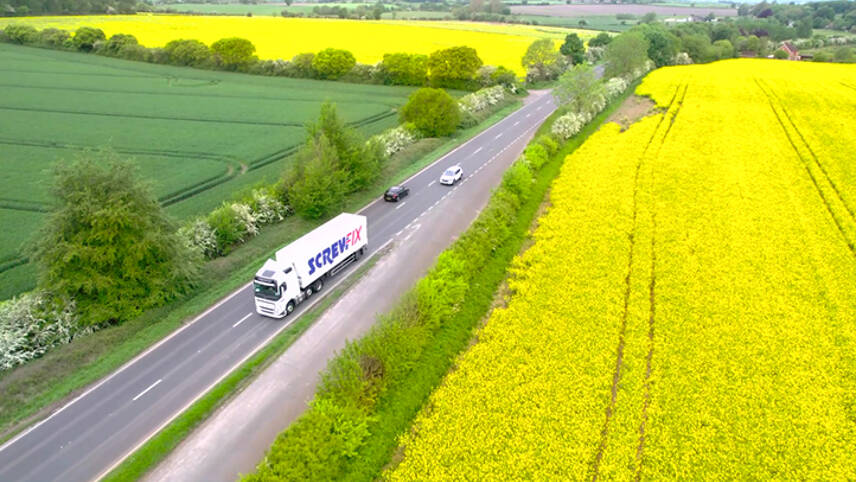This premium content is exclusive to edie Members.
To find out more about edie Membership, please click below.
If you are an existing member, login here

Image: Wincanton
At a Glance
Who: Wincanton, Screwfix
What: Transitioning logistics vehicle fleet to HVO fuel
Where: Screwfix distribution centres in the UK, including Lichfield, Staffordshire
Why: To reduce carbon emissions from transport
When: Trial initiated in 2022; significant fleet transition in March 2023
The Challenge
Heavy-good vehicles (HGVs) contribute more than 4% to the UK’s carbon footprint, and their size poses challenges for electrification. Given Screwfix’s extensive HGV fleet serving distribution centres, finding a sustainable alternative to traditional diesel fuel was crucial to reduce the environmental impact of transportation.
The Solution
Wincanton and Screwfix launched a trial in 2022, involving 48 HGVs operating from the Screwfix distribution centre in Lichfield, Staffordshire. They collaborated with truck manufacturers to ensure that HVO specification fuel was compatible with their fleet. The successful trial led to the installation of HVO fuel tanks at Screwfix’s distribution centres, enabling a shift toward renewable biofuel usage.
How the Project Works
The project involved transitioning a significant portion of Screwfix’s logistics vehicle fleet to HVO. HVO is derived from 100% waste materials, including renewable feedstocks and food waste, such as cooking oil. When used as a diesel alternative, HVO significantly reduces carbon emissions by up to 90% and particulate matter by 83%.
The transition to HVO fuel was executed by ensuring the compatibility of the fuel with the existing fleet and establishing infrastructure for its storage and distribution.
The Results
As of March 2023, approximately 85% of Screwfix’s logistics fleet now operates on HVO, consuming around 90,000 litres of renewable fuel every week. The results have resulted in a substantial reduction in carbon emissions and a positive impact on air quality in the regions where Screwfix operates.
Business Benefits
The adoption of HVO fuel by Wincanton and Screwfix brings multiple benefits. It underscores the long-standing partnership between Wincanton and Screwfix, showcasing their dedication to sustainable supply chain solutions. Additionally, this transition contributes to improving air quality and benefiting local communities.
Investment/Savings
The financial return on investment is not available but it includes the substantial reduction in environmental impact.
Industry Context
In 2022, surface transport constituted 23% of UK emissions, maintaining its status as the highest emitting sector. According to the Government’s Carbon Budget Delivery plans, a reduction of 61 MtCO2e, equivalent to a 58% decrease, is required in sector emissions by 2030.
Wincanton and Screwfix’s commitment to sustainable transport aligns with the broader context of the transportation and logistics sector’s efforts to reduce carbon emissions and shift toward more sustainable practices.
© Faversham House Ltd 2024 edie news articles may be copied or forwarded for individual use only. No other reproduction or distribution is permitted without prior written consent.

